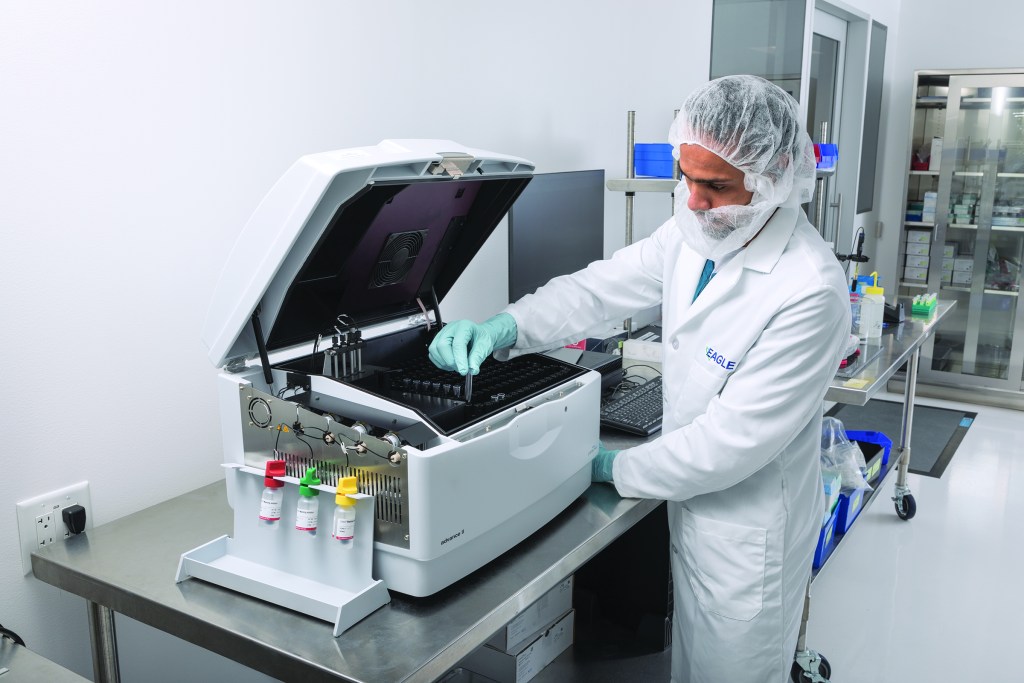Discover Sterility Testing Options
What is Sterility Testing?
Sterility testing is required to ensure viable contaminating microorganisms are not evident in a product. It is crucial in preventing harm, including death, to the end user from microbial contamination.
According to USP chapter <797> Pharmaceutical Compounding; Compounded Sterile Preparations (CSPs) must undergo sterility testing before being dispensed. This requirement depends on factors such as batch size, risk level, environmental monitoring frequency, sporicidal use, and storage conditions. USP <797> specifies that testing must be performed following USP <71> or a validated alternative method per USP <1223> provided that it is not inferior to USP <71>.
Eagle provides 4 types of sterility testing that provide results in 14 days to as Fast as 1 day. This versatility allows Eagle to also support the testing of a wide range of products including but not limited to: Aqueous solutions, oil based solutions, ophthalmic products, inhalation products, cell-based products, tissue derived products and many more.
Method Suitability
Method Suitability Testing (MST) must be performed prior to being able to claim that the results of a USP <71> sterility test, or accepted alternative, works correctly for the specific drug product formulation. Method Suitability Testing only needs to be completed once for each compounded formulation and consists of two parts: i) a suitability test that confirms that the growth media used for sterility testing supports the growth of certain microorganisms and ii) a validation test that demonstrates that no components of the compounded preparation inhibit microbial growth.
ScanRDI®
Results in 1-2 days
World’s Fastest sterility test to date. This technology combines membrane filtration, fluorescent staining, and laser scanning to detect microorganisms quickly and accurately.
Bac/T Alert®
Results in 7 days
This technology detects microbial growth by tracking CO2 production during incubation. Microorganisms as they grow, will metabolize the substrate found in the culture media and produce CO2.
Celsis®
Results in 7 days
It is a growth-based sterility test that detects microbial contamination based on the presence of microbial Adenosine Triphosphate (ATP) in a sample.
USP
Results in 14 days
Direct inoculation and Membrane Filtration are 2 available methods in USP <71>.
ScanRDI®
Results in 1-2 days.
World’s Fastest sterility test to date. This technology combines membrane filtration, fluorescent staining, and laser scanning to detect microorganisms quickly and accurately.
- Eagle owns a patent for testing oil-based solutions using ScanRDI technology.
- Release products from quarantine 90% faster.
- **Expedited Services Guarantee Results within 12-24hrs**


USP <72> Sterility Test using BacT/Alert® system
Results in 7 days.
This technology detects microbial growth by tracking CO2 production during incubation. Microorganisms as they grow, will metabolize the substrate found in the culture media and produce CO2.
- Suitable for cell and gene therapy samples
- Suitable for aseptic foods and beverages
- Cutting quarantine hold times by 50%
- A wide range of pharmaceutical products products
USP <73> Sterility Test using Celsis® system
Results in 7 days.
It is a growth-based sterility test that detects microbial contamination based on the presence of microbial Adenosine Triphosphate (ATP) in a sample.
- Suitable for aqueous/oil solutions, suspension, highly viscous products
- Cutting quarantine hold times by 50%


USP <71> Sterility Test
Results in 14 days.
Direct inoculation and Membrane Filtration are 2 available methods in USP <71>.
Membrane Filtration is the preferred method according to USP <71> and USP <797>. This method is widely used due to its effectiveness in filtering out microorganisms from liquid and soluble powder samples. Sterile, enclosed units allow for the simultaneous filtration of equal volumes of test samples through two membrane filters. Samples are then incubated in two types of media (TSB and FTM) for 14 days, facilitating the detection of both aerobic and anaerobic microorganisms.
Direct Inoculation is a process in which the test sample is directly inoculated into the same 2 types of media mentioned above, thus bypassing the filtration phase. This test is usually reserved for test samples that demonstrate incompatibility with the Membrane Filtration method.

Get Started Today
Got Sterility Testing Needs?
Call the Eagle Client Care Team at (800) 745-8916 to discuss your operation’s specific needs and answer any questions!
WE TEST, WE CERTIFY, WE CONSULT
Maintaining Compliance Has Never Been Easier
Please contact Client Care or complete and submit the pricing request form above for the most up-to-date information on our testing and consulting services and for assistance with submitting a sample via EagleTrax. We look forward to serving you!
